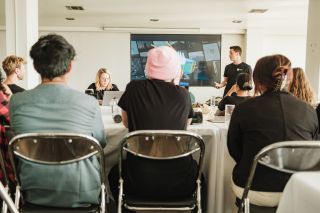Career
Make Your Work Meetings Better
Despite their ubiquity, most people don't do meetings well.
Posted August 14, 2023 Reviewed by Monica Vilhauer
Key points
- Good meetings create community, communicate information, or offer an opportunity to brainstorm.
- To be a good meeting citizen, start by making good use of your time.
- Preparing in advance of a meeting is almost as important as the time spent in the meeting.
With so much interdependent work going on and handoffs to plan, meetings have become ubiquitous in the collaboration-revolution workplace. People often tell me that they have no time to work because they spend their whole workday in meetings on top of meetings, and too often, the meetings are not so great. The stakes are high because every single minute consumed in any meeting is multiplied by the number of people. A thirty-minute meeting with eight people consumes four hours of productive capacity (time in which people could be working on something else).

Meetings can be great opportunities, but not all meetings are great. Most good meetings happen for one of three reasons:
- To create a feeling of belonging and togetherness
- To communicate a bunch of information to a bunch of people in the same way at the same time
- To brainstorm on a specific project or other open question, such as planning interdependent project handoffs in which multiple people need to hear and respond to each other
Some corporate conference rooms even go so far as to list rules of conduct on the door outside, such as: “If you are the host, distribute an agenda in advance to all participants,” “Silence your phones,” or even “Please clean up after yourself.” These types of messages may seem unnecessary or insulting. But they exist for a reason. The truth is that some people simply do not know how to conduct themselves well in meetings unless reminded.
Nonetheless, people still hold meetings without clear agendas, or even if they have a clear agenda, they don’t follow it. Some people go way over the allotted time, digress, hold one-on-one crosstalk conversations on the side, or try to multitask with handheld devices or laptops (sometimes pretending to take notes) and then chime in with a point that’s already been made.
Become known for being great at meetings
Just as people notice when colleagues are especially horrible at running or attending meetings, they also notice people who are great at meetings. Be that person.
First, be known as a great meeting citizen. Be informed and be reliable. Make sure you don’t double- or triple- book yourself for meetings. It’s amazing how common this has become among would-be go-to people, because they think it makes them seem busy. Being double-booked is not impressive. You cannot be in more than one place at a time, and it’s distracting if you’re hopping in and out of meetings in progress. If you have conflicts, make a choice and choose the most important meeting, not the easiest one. That doesn’t mean the meeting with the most big shots or the highest-profile work, but rather the meeting where you play an important role and have the most value to add. If you are not sure, align with your boss.
Then, before attending any meeting or presentation, make sure you know what the meeting is about and whether your attendance is required or requested. One of the biggest favors you can do for yourself is to become savvy about which meetings to attend and which ones not to. Again, make sure to align with your boss. The key is knowing exactly what your role in the meeting is: What information are you responsible for communicating or gathering? Prepare in advance any material you should review or read before the meeting. Are there any conversations you need to have before the meeting? If you are making a presentation, of course you’ll prepare even more. Ask yourself exactly what value you have to offer the group and then be sure you deliver that value.
If you are not a primary actor, or you don’t have some other clear role in the meeting, try not to say a single word that will unnecessarily lengthen it. And practice good meeting manners: Do not try to multitask or make unnecessary noise or activity. Stay focused on the business at hand. Listen carefully and learn. If you are tempted to speak up, ask yourself: Is this a point that everyone needs to hear, right here and now? If you have a question, consider whether the question is important to the purpose of the meeting, or whether you could get your question answered later by referring to a document or asking someone.


